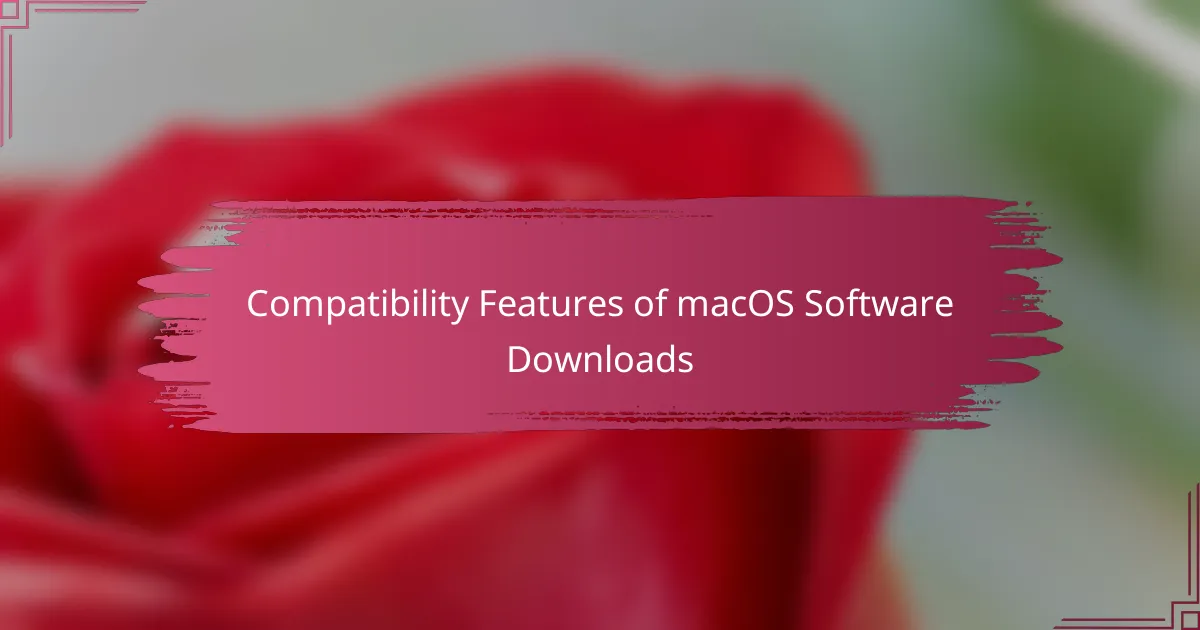Linux-compatible software provides developers with a stable, secure, and customizable environment for coding and testing applications. Its open-source nature fosters collaboration and innovation, while a wide array of tools and libraries accelerates the development process. Popular programming languages such as Python, Ruby, and Java, along with Integrated Development Environments (IDEs) like Visual Studio Code and Eclipse, enhance productivity on Linux systems. Additionally, version control systems like Git and frameworks such as Node.js and Django are essential for efficient software development. By leveraging these resources, developers can optimize their workflows and improve software quality while minimizing costs.

What are the benefits of Linux-Compatible Software for Developers?
Linux-compatible software offers numerous benefits for developers. It provides a stable and secure environment for coding and testing applications. The open-source nature of Linux encourages collaboration and innovation among developers. Many tools and libraries are readily available, which accelerates the development process. Developers can customize their environments to fit their specific needs. Linux systems often require fewer resources than other operating systems, enhancing performance. Additionally, Linux-compatible software is typically free, reducing costs for developers and organizations. According to a survey by Stack Overflow, over 25% of developers prefer Linux for its flexibility and control.
How does Linux-Compatible Software enhance development efficiency?
Linux-compatible software enhances development efficiency by providing a stable and customizable environment. Developers benefit from a wide range of open-source tools available on Linux. These tools often have lower resource requirements, allowing for faster performance. The command-line interface in Linux allows for quick access to functionalities, streamlining workflows. Furthermore, Linux supports various programming languages natively, facilitating diverse development tasks. Collaboration is improved through package managers that simplify dependency management. According to a 2021 survey by Stack Overflow, 27.4% of developers prefer Linux for its efficiency and flexibility. This preference indicates a strong correlation between Linux use and enhanced productivity in development environments.
What are the key features that contribute to enhanced efficiency?
Key features that contribute to enhanced efficiency in Linux-compatible software include flexibility, resource management, and automation tools. Flexibility allows developers to customize their environments to suit specific project needs. Resource management optimizes system performance, ensuring that applications run smoothly without unnecessary overhead. Automation tools streamline repetitive tasks, reducing manual effort and increasing productivity. These features collectively enable developers to focus on coding rather than troubleshooting, ultimately improving workflow and output quality.
How do these features compare with other operating systems?
Linux-compatible software features often excel in flexibility and customization compared to other operating systems. Linux allows developers to modify the source code, enabling tailored solutions for specific needs. In contrast, proprietary systems like Windows or macOS limit customization options. Furthermore, Linux software typically supports a wide range of programming languages and tools, enhancing development versatility. Other operating systems may not offer the same breadth of open-source tools. Additionally, Linux’s package management systems streamline software installation and updates, which can be more cumbersome on other platforms. This efficiency is backed by numerous studies highlighting Linux’s lower total cost of ownership for development environments.
Why is Linux a preferred choice for developers?
Linux is a preferred choice for developers due to its open-source nature. This allows developers to modify and customize the operating system according to their needs. The extensive community support provides access to a wealth of resources and documentation. Developers can collaborate easily and share solutions within this community. Linux also offers robust security features, making it a reliable environment for development. The availability of powerful command-line tools enhances productivity for developers. Furthermore, Linux supports a wide range of programming languages and frameworks. This flexibility enables developers to work on diverse projects seamlessly. According to a survey by Stack Overflow, over 25% of professional developers prefer Linux as their primary operating system.
What unique attributes does Linux offer to developers?
Linux offers several unique attributes to developers. Its open-source nature allows developers to access and modify the source code freely. This fosters innovation and collaboration among developers worldwide. Linux supports a variety of programming languages, including C, C++, Python, and Java. This versatility enables developers to choose the best tools for their projects.
Linux is known for its stability and performance, making it a reliable environment for development. It also features a powerful command-line interface, which enhances productivity for advanced users. The extensive community support provides resources, documentation, and forums for troubleshooting.
Additionally, Linux offers strong security features, which are crucial for developing secure applications. Its compatibility with various hardware platforms allows developers to deploy applications across different systems easily. These unique attributes make Linux a preferred choice for many developers in the tech industry.
How does the open-source nature of Linux benefit developers?
The open-source nature of Linux significantly benefits developers by providing unrestricted access to its source code. This access allows developers to modify, enhance, and customize the operating system according to their specific needs. Developers can collaborate with others globally, fostering a community-driven environment for innovation. The transparency of the code helps in identifying and fixing bugs more efficiently. Additionally, developers can leverage a vast range of libraries and tools that are available for free. According to a 2020 survey by Stack Overflow, 70% of developers prefer open-source technologies for their flexibility and cost-effectiveness. This preference illustrates the practical advantages of using Linux in development projects.

What types of Linux-Compatible Software are available for developers?
Linux-compatible software for developers includes various categories such as programming languages, development environments, version control systems, and libraries. Popular programming languages include Python, Ruby, and Java, all of which run seamlessly on Linux. Integrated Development Environments (IDEs) like Visual Studio Code and Eclipse are widely used in Linux environments. Version control systems, such as Git, are essential for managing code and collaboration. Additionally, libraries and frameworks like Node.js and Django enhance development capabilities on Linux. These tools are critical for efficient software development, as they provide robust support and community resources.
What are the most popular development tools on Linux?
The most popular development tools on Linux include GCC, Git, and Visual Studio Code. GCC is a widely used compiler for C and C++ programming languages. Git is a version control system that facilitates source code management. Visual Studio Code is a powerful code editor known for its extensibility. Other notable tools are Eclipse, IntelliJ IDEA, and Docker. Eclipse is an integrated development environment (IDE) for Java development. IntelliJ IDEA supports various programming languages and offers advanced code assistance. Docker is essential for containerization and deployment of applications. These tools are popular due to their functionality and community support.
How do these tools support various programming languages?
These tools support various programming languages by providing cross-platform compatibility and integrated development environments. They offer syntax highlighting, code completion, and debugging features tailored for different languages. Many tools include plugins or extensions that enhance functionality for specific programming languages. They facilitate version control and collaboration across diverse programming environments. Additionally, these tools often support multiple compilers and interpreters, allowing developers to run code in different languages seamlessly. For example, tools like Visual Studio Code and Eclipse provide extensive language support through community-driven extensions. This capability enhances productivity and streamlines the development process for developers working in multi-language projects.
What are the advantages of using integrated development environments (IDEs) on Linux?
Integrated development environments (IDEs) on Linux offer several advantages. They provide a comprehensive set of tools for software development. IDEs typically include code editors, debuggers, and build automation tools. This integration enhances productivity by streamlining the development process.
Linux IDEs often support multiple programming languages, accommodating diverse project needs. They also offer customizable features tailored to user preferences. Many IDEs are open-source, allowing for community-driven improvements and support. Additionally, they often have robust version control integrations, facilitating collaboration among developers.
According to a survey by JetBrains, 70% of developers prefer using IDEs for their efficiency and ease of use. This preference highlights the significant role of IDEs in optimizing the development workflow on Linux.
What role do package managers play in Linux development?
Package managers are essential tools in Linux development. They automate the process of installing, updating, and removing software packages. This functionality simplifies dependency management, ensuring that all required libraries and tools are available for a program to run. Package managers also provide a centralized repository for software, enhancing security and consistency. Popular package managers include APT for Debian-based distributions and YUM for Red Hat-based systems. They help maintain system stability by allowing developers to easily track and manage installed packages. This efficiency is crucial in collaborative development environments.
How do package managers simplify software installation and updates?
Package managers simplify software installation and updates by automating the process. They handle dependencies automatically, ensuring all necessary libraries are installed. This reduces the complexity of managing software manually. Package managers also provide a centralized repository for software, making it easy to find and install applications. They allow users to update all installed software with a single command. This ensures that software remains up-to-date and secure. Additionally, package managers can roll back updates if issues arise, enhancing system stability. Their use of version control helps prevent conflicts between software packages. These features collectively streamline the software management process for developers on Linux systems.
What are some commonly used package managers for Linux?
Commonly used package managers for Linux include APT, YUM, DNF, and Pacman. APT, or Advanced Package Tool, is prevalent in Debian-based distributions like Ubuntu. It simplifies the installation and management of software packages. YUM, or Yellowdog Updater Modified, is commonly used in Red Hat-based distributions. DNF, or Dandified YUM, is the next-generation version of YUM, providing improved performance and dependency resolution. Pacman is the package manager for Arch Linux, known for its simplicity and speed. Each of these package managers facilitates software installation, updates, and dependency management, streamlining the development process on Linux systems.

How can developers maximize the benefits of Linux-Compatible Software?
Developers can maximize the benefits of Linux-Compatible Software by leveraging its open-source nature. This allows for customization and optimization according to specific project needs. Utilizing package managers can streamline software installation and updates. Developers should also engage with community forums for troubleshooting and support. Adopting version control systems like Git enhances collaboration and code management. Testing software in various Linux distributions can ensure compatibility and performance. Additionally, utilizing Linux-based development environments can improve efficiency and reduce resource consumption. These practices enhance productivity and lead to higher-quality software outcomes.
What best practices should developers follow when using Linux software?
Developers should follow several best practices when using Linux software. First, they should familiarize themselves with the command line interface. The command line provides powerful tools for managing files and processes efficiently. Second, developers should keep their systems updated. Regular updates ensure security patches and new features are applied. Third, they should utilize package managers for software installation. Package managers simplify the process of installing and updating software. Fourth, developers should follow best practices for file permissions. Proper permissions enhance security and prevent unauthorized access. Fifth, they should document their processes and configurations. Documentation aids in troubleshooting and knowledge sharing. Lastly, developers should engage with the Linux community. Community forums and resources offer support and insights into best practices.
How can developers contribute to the Linux community?
Developers can contribute to the Linux community by participating in open-source projects. They can write and share code, fix bugs, and improve documentation. Contributing to forums and mailing lists helps share knowledge and solutions. Developers can also report issues and provide feedback on software. Engaging in local Linux user groups fosters collaboration and learning. Many developers contribute by creating tutorials and guides for new users. Supporting Linux events and conferences enhances community engagement. By contributing, developers help improve the Linux ecosystem and promote its use.
What resources are available for learning more about Linux development?
Online courses are available for learning Linux development. Platforms like Coursera, Udacity, and edX offer structured courses. Books such as “Linux Programming by Example” provide in-depth knowledge. The Linux Foundation offers certifications and training resources. Community forums like Stack Overflow and Reddit are valuable for peer support. Documentation from the official Linux website is crucial for understanding system specifics. Tutorials on websites like Linux.com and HowtoForge cover practical aspects. These resources collectively support learning Linux development effectively.
What troubleshooting tips can help developers using Linux-Compatible Software?
Check software dependencies to ensure all required libraries are installed. Use package managers like APT or YUM for installation verification. Examine error messages in the terminal for specific issues. Consult log files located in /var/log for detailed error information. Run software in a different environment using containers like Docker for isolation. Update the software to the latest version to fix known bugs. Seek help from community forums or documentation for additional support. Utilize debugging tools such as GDB for in-depth problem analysis.
The main entity of this article is Linux-compatible software, which provides significant benefits for developers. It offers a stable, secure, and customizable environment that enhances coding and testing efficiency. Key features include a wide range of open-source tools, robust community support, and lower resource requirements compared to other operating systems. The article also explores how package managers streamline software installation, the advantages of integrated development environments (IDEs), and best practices for maximizing the benefits of Linux in development. Additionally, it highlights the unique attributes of Linux that make it a preferred choice among developers, such as flexibility, performance, and strong security features.



